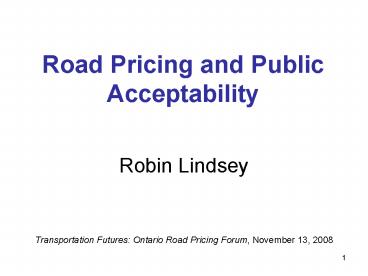Road Pricing and Public Acceptability
1 / 20
Title: Road Pricing and Public Acceptability
1
Road Pricing and Public Acceptability
- Robin Lindsey
- Transportation Futures Ontario Road Pricing
Forum, November 13, 2008
2
Outline
- Public attitudes to road pricing generally
- Institutional and public attitudes in Canada
3
Traditional objections to road pricing 1
- 1. Paying for something that was free
- Canadian roads traditionally provided publicly
without direct user charges. - 2. Double taxation
- Most road-pricing schemes not revenue neutral.
- The Netherlands intends to modify its current
road tax system. - UK has considered lowering fuel taxes if a
national scheme is introduced.
4
Traditional objections to road pricing 2
- 3. Inequitable
- With respect to income
- Higher-income groups more likely to gain because
willing to pay more for travel time savings. - Caveat Lower-income groups could benefit if
public transit service is improved. - With respect to location
- Tolling of residential streets
- Tolling of road networks
- Japanese policy is not to differentiate toll
rates by link
5
Traditional objections to road pricing 3
- 4. System complexity
- People dislike complex price structures
generally (driving, public transport,
telecommunications ) - This militates against varying tolls frequently
by time of day, multiple charging points,
discounts ... - Complex schemes that failed
- Hong Kong proposals (1985, mid-1990s)
- Edinburgh double cordon (2005)
- New York City area-based scheme (2008)
- Complex schemes that succeeded
- HOT lanes in US with dynamic tolls
- Electronic road-pricing in Singapore
6
Traditional objections to road pricing 4
- 5. Invasion of privacy
- Largely addressed by anonymous electronic
tolling technology - Concern with satellite-based systems
- 6. Loss of retail business
- Retailers generally oppose road pricing
initially. - But
- Studies indicate effects are modest
- Any lost business from drivers could be offset by
gains from shoppers using other modes.
7
Opposition to UK national scheme
- The idea of tracking every vehicle at all times
is sinister and wrong. - Road pricing is already here with the high level
of taxation on fuel. The more you travel - the
more tax you pay. - It will be an unfair tax on those who live apart
from families and poorer people who will not be
able to afford the high monthly costs. - Please Mr Blair - forget about road pricing and
concentrate on improving our roads to reduce
congestion. - 1. Invasion of privacy
- 2. Double taxation
- 3. Inequitable
- 4. Views improving roads as an alternative to
tolls
8
Recent US survey evidence 1
- Survey of 110 US public opinion studies of
pricing - Source Zmud (2008, NuStats)
9
Recent US survey evidence 2
- Source Zmud (2008, NuStats)
10
Recent US survey evidence 3
- Public support generally higher for
- Specific projects with tangible benefits
- Revenues earmarked for highways or public transit
- Not to special interest groups such as investors
- Simple projects
- Prefer toll roads to mileage fees
- Tolls preferred to taxes or reduced service
- Source Zmud (2008, NuStats)
11
Attitudes before and after
- Support increases after tolling begins
- Norway, London, Stockholm, U.S. HOT lanes
12
Outline
- Public attitudes to road pricing generally
- Institutional and public attitudes in Canada
13
Federal studies
- Royal Commission on National Passenger
Transportation (1992) - National Transportation Act Review Commission
(1993) - Canada Transportation Act Review (2001)
- Investigation of the Full Costs of Transportation
(2003) - Studies supported marginal social cost pricing
for transport and the user pays principle
14
Historic opposition to tolls 1
- Fredericton-Moncton highway project
- In 1998, New Brunswick government entered a PPP
(design, finance, build, operate maintain, 25
years). - Toll to be imposed on pre-existing toll-free
section. - Public resistance to toll contributed to downfall
of government. - New government revised contract to compensate
contractor with shadow tolls. - Toll collection ended in 2000.
15
Historic opposition to tolls 2
- Coquihalla Highway
- Operated as public toll road 1986-2008.
- In 2003, BC government proposed privatization on
55-year lease. - Car toll expected to jump from 10 to 13, and
rise over time. - Massive opposition.
- Government backed down.
- Car toll remained at 10 until tolling ended.
16
Public attitudes in Québec
- Preferred type of user charge
17
Institutional attitudes in Vancouver 1
- Governments and agencies
18
Institutional attitudes in Vancouver 2
- TransLink Strategy Discussion Guide (Oct. 2007)
- 6 wrote in favour of tolls. Other 2 no mention.
19
Public attitudes in Canada generally
- Tolls more acceptable
- On new capacity (especially if not otherwise
built) - If a reasonable toll-free alternative exists
- If revenues earmarked to the tolled facility
- If toll increases are moderate
- Overall Attitudes vary across governments, other
institutions and the public.
20
References
- Léger Marketing. 2007. Opinion of Quebeckers on
road network funding. Montreal Economic
Institute Research Report September 2007,
MEI-Journal de Montréal-Léger Marketing Opinion
Poll, September 2007 (www.iedm.org/uploaded/pdf/so
ndage0907_en.pdf). - Lindsey, Robin. 2006. Do Economists Reach a
Conclusion on Highway Pricing? The Intellectual
History of an Idea. Econ Journal Watch. 3(2)
292-379. - Lindsey, Robin. 2007. Congestion Relief
Assessing the Case for Road Tolls in Canada.
C.D. Howe Institute Commentary 248. - Lindsey, R. 2008. Prospects for Urban Road
Pricing in Canada. G. Burtless and J. Rothenberg
Pack (eds.), Brookings Wharton Papers on Urban
Affairs 2008, 235-293. - Schade, J. and Schlag, B. eds. 2003.
Acceptability of Transport Pricing Strategies,
Elsevier, Amsterdam. - Zmud, J. 2008. The public supports pricing If
A synthesis of public opinion studies on tolling
and road pricing. International Bridge, Tunnel
and Turnpike Association, Tollways, Winter, 28-39
(http//www.ibtta.org/files/PDFs/win08_Zmud.pdf).































